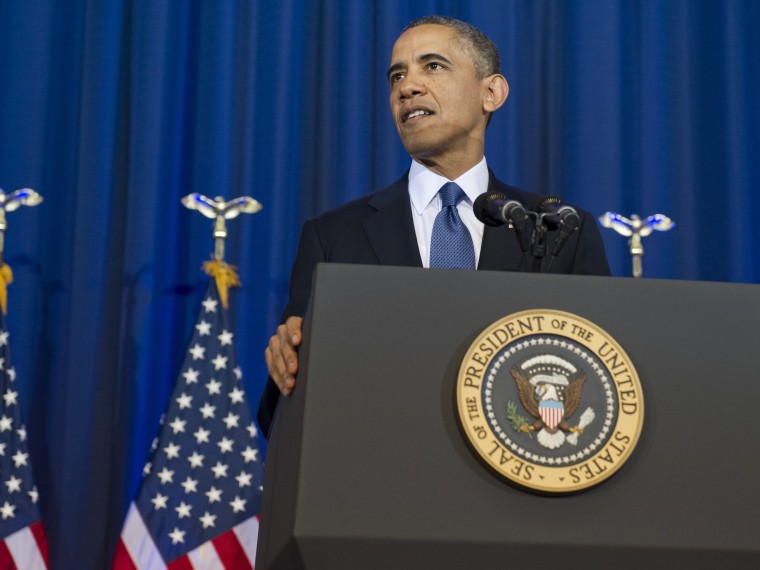President Obama's speech Thursday was eagerly anticipated by those of us who have worked for years to challenge detentions at Guantanamo and targeted killings abroad. As much as we would like to be optimistic, after more than a decade of this work the persistence of Guantanamo—despite the continued promise for closure—is a constant reminder that hopes have been dashed before.
So, while the president made some worthwhile proposals that would put us on a better path, Obama's speech was heavy on rhetoric and process about Guantanamo, but woefully short on commitment to immediate action.
On targeted killing, he reasserted the same flawed premise of a war of global dimensions, not only against al Qaeda in Afghanistan, but so-called "associated forces," wherever they may be. He spoke movingly and importantly about the dawn of a new day, but made clear that day is still not today, despite 12 years of "war."
Obama's most specific and important announcement was that he will repeal the moratorium on sending some Yemeni detainees home. That moratorium has trapped more than half of the men at Guantanamo, 56 of whom have been cleared for release for years. But the rest of his speech lacked the specificity and urgency warranted by the 11-year crisis at the base.
On transfers, he stated only that cleared men will be released "to the greatest extent possible." He did not, for example, say that he would immediately require Secretary of Defense Chuck Hagel to begin certifying men for transfer, or issuing waivers to begin rapidly drawing-down the prison population. That is something he could begin doing tomorrow and would spare our cleared clients, Djamel Ameziane and Mohammed Al-Hamiri, and scores of other Guantanamo detainees continued unnecessary torment.
Instead, he called on Congress to lift restrictions on other transfers and promised to take the issue of closing Guantanamo back to Congress. But while lifting the restrictions may ultimately be necessary, the president has—right now—the legislative authority he needs to begin drawing down the population and closing the prison. Lives are at stake. The men at Guantanamo depend on Obama acting.
Another glaring omission about Guantanamo was any mention of the rapidly deteriorating conditions at the prison. The use of solitary confinement and sexually humiliating body searches are commonplace at the prison. His Defense Department clearly has the authority to change that.
Much of Obama's speech addressed his targeted killing program, under which the Justice Department acknowledged this week that it killed four American citizens in drone strikes in Yemen. Yet, Obama offered no specific proposals for accountability for those deaths or scores of others, and omitted one of the most obvious routes - ordinary judicial review of alleged violations.
Despite promising in his speech for more oversight and transparency, the administration's recent responses to Congress have not been heartening. The Senate committee tasked with oversight of the program had to demand—repeatedly—to see basic legal memos justifying the killing of Americans, never mind foreign citizens.
While Obama outlined ostensibly narrower standards for the targeting of individuals - requiring a "continuing and imminent" threat and "infeasibility of capture" before lethal force may be used—the proof will be in the pudding. The Justice Department interpretation of imminence in a leaked white paper—for example, that it does not require clear evidence of a specific threat in the immediate future—gives cause for skepticism. If imminence doesn't mean imminence, it's hard to see how much real change we'll see in the program.
The president stated that we need to think about the world we are creating and leaving behind, but codifying this program sets a dangerous precedent for other countries and future administrations. If the White House were complying with existing, accepted legal standards, there would be no need for a new playbook.
In May 2009 a number of human rights leaders and I met with the president just before his national archives speech, his last major address on national security. As I noted at the time, the news was how drastically Obama pivoted towards the Bush approach to detention policy. With respect to Thursday's speech, what didn't happen was a pivot back to the path of the rule of law and justice.
